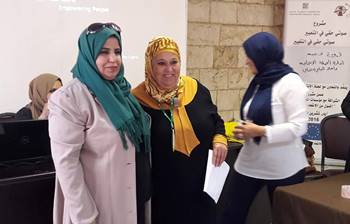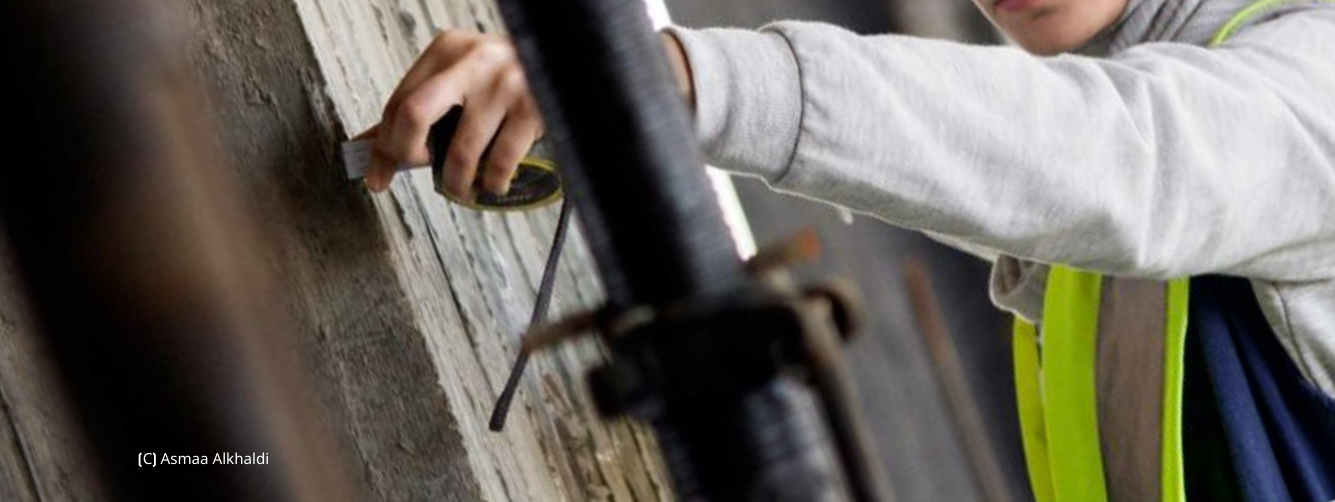
With MIFTAH’s support over a long journey that began in 2001 and continues until this day, Naela Awad from the village of Jbara in the Kafriyat region near Tulkarm, finally achieved her goal of becoming a village council member along with one other woman and nine men. The council now runs all of the village’s affairs after it broke away from the Kafriyat local council and claimed its independence. Today it is facing several challenges that need tackling in order to get Jbara back on its feet.
The 2017 election experience
For Awad, the elections on May 13, 2017 reflected the importance of her role in the community, which is why she decided to run and, fortunately, win. Her victory was a victory over the marginalization of and inferior attitude towards women in her community. This attitude, she maintains, did not change overnight just because she won a council seat. But it is a challenge she faces head on, ensuring that she now participates in the council’s decision-making process. Awad says she believed in herself and was confident in her determination and leadership abilities, which she adds, are products of MIFTAH’s training and workshops.
Relationship with MIFTAH
Awad acknowledges MIFTAH’s part in her role as community activist and now council member, a position she won by acclamation. She says she won the support of her community, especially the women, in a village with a population of approximately 200. She says she considers herself one of “MIFTAH’s women”. Awad continues: “The support I received from MIFTAH was essential and key to me; it strengthened and empowered me through all of the meetings and training workshops I attended on leadership, planning and action.” She said its role was essential in softening the policy of marginalizing women, which is exercised in many matters and in most institutions and decision-making positions. “After all this, I can truly say that I can now demand what I want and specify the needs of the village and its women; I can contribute to changing the hardships under which all of Jbara’s resident’s live, especially its women.” Awad explained that her village suffers from a sort of siege because of Israel’s separation wall and an army checkpoint at its only entrance in addition to being marginalized by official institutions. “This marginalization is partly due to the fact that we were a village within the Kafriyat council,” she explains, adding that this has now changed with their independence. “One of my first priorities was to make Jbara’s voice heard loud and clear and to press officials, especially the local government ministry to pay attention to our needs as a marginalized community. As for us women, we suffer from double marginalization.”
Challenges and solutions
Awad says there are many challenges, many of which she is willing to face head-on. She says he hopes MIFTAH can be a catalyst and tool for helping the women of the village and the Jbara community as a whole to improve its conditions and overcome the problems it faces. She cites the psychological pressures on the village’s youth because of the occupation’s siege as one of the most significant problems, saying it has deprived them of their freedom of movement and of enjoying their lives.
The solutions, according to Awad, begin with official institutions responding to her demands as a local council member, a call she makes every day. “Extend your hands to Jbara, to its youth, its women, to everyone,” she says, adding that she will never stop demanding rights for her fellow villagers or making efforts to alleviate the burdens in their lives.
Hope for a better future
Becoming a member of the inventory committee in the Jbara village council was a huge deal for Awad, something she was able to achieve largely because of the empowerment and leadership training by MIFTAH. The impact of this has strengthened her status within the council, she says, maintaining that she now in council meetings, she is part of the discussions and decisions. “I am no longer just a table leg,” she quips. This newfound confidence also meant her influence on other women in the council has grown and has prompted them to attend all of its meetings and become part of the decision-making process. “I never miss a meeting and I always participate,” Awad says. “This is my right. As long as I was able to reach this position with support from my village and its women in particular, it is my duty to do my job well.” She realizes, of course, that it is not an easy task. “I am aware that there are many major challenges and that our village needs a lot of work. It needs institutions and associations that offer assistance to women and also community centers and youth clubs.”
Big aspirations
Despite, and perhaps because of these challenges, Awad is even more determined to overcome them so that Jbara can rise above its difficulties and look to a better future. Awad wants the village’s women to have a more active role in the future of the village. As for herself, she dreams big, saying her aspiration is to become head of the village council. “I have absolute faith in the ability of women to reach their goals,” she says, citing her own goal as defending women’s rights and making their voices heard. Awad also maintains that she wants to promote a positive image of the role of women and to encourage respect for them, recognition of who they are and of their equality with men.







